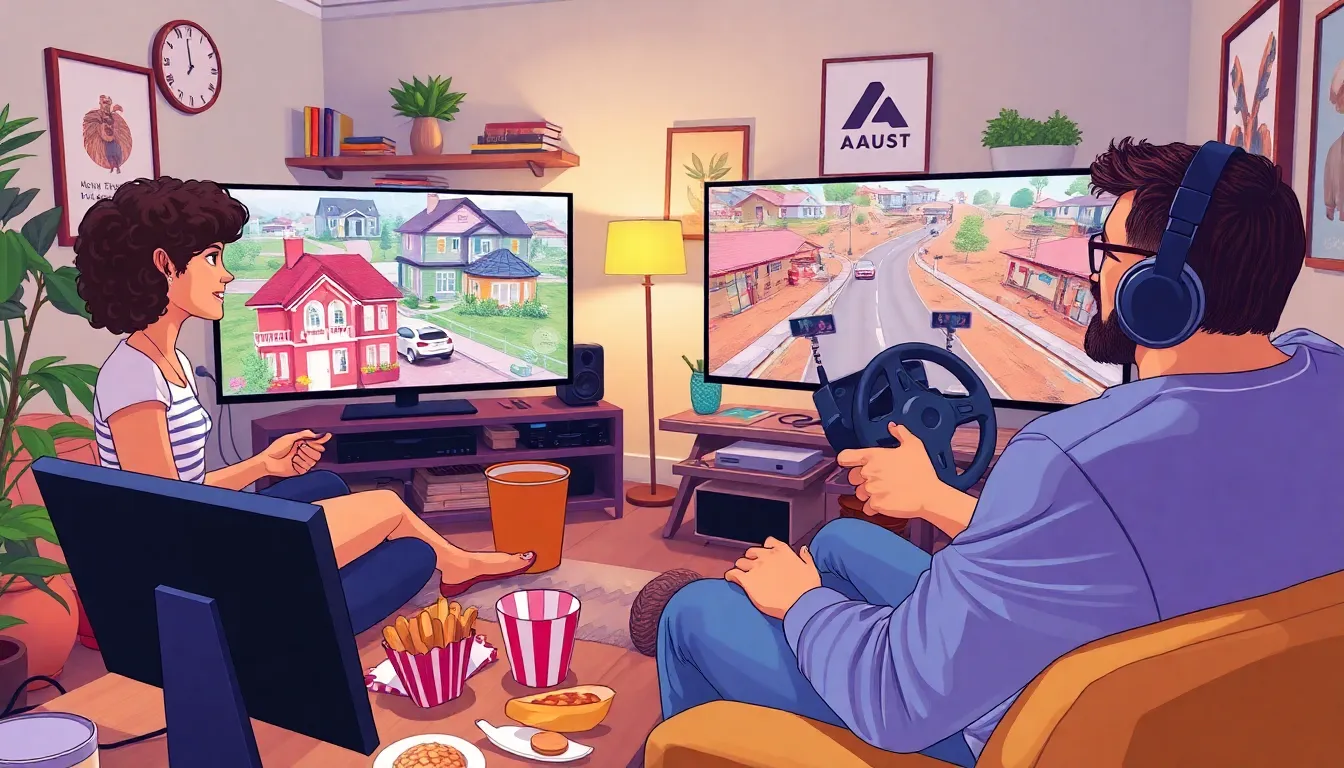Imagine a world where you can build empires, race cars, or even run a farm—all while sitting in your pajamas. Multiplayer simulation games offer that and more, blending creativity with competition in a way that keeps players coming back for more. Whether it’s strategizing with friends or competing against foes from across the globe, these games create dynamic experiences that are hard to resist.
Multiplayer Simulation Games
Multiplayer simulation games create immersive environments where players can participate in diverse activities. These games involve experiences like constructing cities, managing businesses, or competing in thrilling races. Each game emphasizes strategic thinking and planning, allowing players to build unique virtual worlds.
Gameplay often incorporates real-time interactions with other players, enhancing engagement. Players work collaboratively or competitively to achieve objectives, fostering teamwork in some scenarios and rivalry in others. Building alliances can lead to shared resources, while competing for supremacy drives players to hone their skills.
The variety in gameplay mechanics appeals to numerous interests. Racing simulation games, for instance, let players feel the adrenaline rush of high-speed competition. Life simulation games, like “The Sims,” allow players to design and control virtual lives, presenting endless creative possibilities.
Technological advancements continue to enhance multiplayer experiences. Graphics and sound improve every year, making environments more realistic. Additionally, player communities thrive through forums and social media, creating spaces for sharing tips, strategies, and customization ideas.
Game developers frequently implement updates based on user feedback. These updates often introduce new features, characters, or scenarios, keeping the gameplay fresh. As a result, players remain engaged long-term, returning to their favorite games to explore new content.
Multiplayer simulation games cater to different age groups and preferences. Families can enjoy cooperative gameplay, while competitive players engage in high-stakes challenges. This diversity contributes to the genre’s growing popularity.
Types of Multiplayer Simulation Games


Multiplayer simulation games categorize into several distinct types, each offering unique gameplay experiences. Players engage in these simulations to explore different aspects of life, work, and adventure.
Social Simulation Games
Social simulation games allow players to create and manage virtual communities and relationships. Popular examples include “The Sims” series and “Animal Crossing,” where players design homes and interact with diverse characters. These games emphasize social interactions and community development, enabling players to build connections and engage in collaborative storytelling. Many players enjoy customizing environments and creating narratives that reflect their personalities, making these games deeply personal and engaging.
Vehicle Simulation Games
Vehicle simulation games focus on the operation and management of various vehicles, offering a range of experiences from racing to flight. Titles like “Forza Motorsport” and “Microsoft Flight Simulator” immerse players in realistic driving or flying environments. Players experience the thrill of competition in racing simulations or navigate complex landscapes in flight simulations. These games often include detailed vehicle mechanics and realistic physics, enhancing the immersive aspect of gameplay. Community features often provide avenues for sharing experiences, tips, and modifications, fostering a dedicated player base.
Popular Multiplayer Simulation Games
Multiplayer simulation games attract players with immersive worlds and diverse gameplay mechanics. Here are two noteworthy titles that exemplify this genre.
Game 1: Features and Gameplay
The Sims offers a detailed simulation experience where players create and manage virtual lives. Inhabitants can interact, form relationships, and develop careers. Players can customize homes and environments, showcasing creativity. Well-designed NPCs (non-playable characters) enrich social interactions, making storytelling dynamic. Frequent updates introduce new features catering to player creativity, enhancing replay value. Its engaging multiplayer element allows for sharing creations and experiences online.
Game 2: Features and Gameplay
Forza Motorsport stands out in the vehicle simulation segment, emphasizing realistic driving experiences. Players can race on meticulously crafted tracks with detailed car physics. Extensive customization of vehicles enables modifications for performance and aesthetics. Competitions offer various race formats, from time trials to full leagues. Frequent updates keep vehicle rosters fresh, inviting players to explore new cars and tracks. The game facilitates community interactions through online challenges and leaderboards, driving competition among players.
Benefits of Playing Multiplayer Simulation Games
Playing multiplayer simulation games offers numerous advantages. Players enhance their strategic thinking skills by managing resources and making real-time decisions. Cooperative gameplay encourages teamwork, fostering social connections among participants.
In addition, these games promote creativity through immersive environments where players design cities or customize vehicles. Engaging in these activities gives a sense of achievement as players build their virtual worlds. Shared experiences create lasting friendships, enriching the gaming community.
Gaming also provides stress relief. Immersing in a simulated world allows individuals to escape daily pressures while enjoying interactive challenges. Whether racing cars or cultivating farms, players find joy in diverse gameplay mechanics.
Moreover, multiplayer simulation games often update based on player feedback. Frequent updates introduce new features and improvements, maintaining player interest and enhancing the gaming experience. This responsiveness from developers ensures that games remain relevant and enjoyable over time.
A thriving online community supports these games. Players exchange tips, strategies, and experiences on forums and social media. This collaborative environment fosters learning and improvement, making gaming more rewarding.
Lastly, multiplayer simulation games cater to various interests and age groups. They appeal to casual gamers and dedicated enthusiasts alike. Fostering both cooperation and competition, these games create engaging and dynamic environments that keep players returning for more.
Community and Social Interaction in Multiplayer Simulation Games
Community engagement defines multiplayer simulation games. Players form friendships, collaborate on projects, and share their experiences in these vibrant virtual worlds. Discussion forums and social media platforms host lively exchanges about strategies, tips, and gameplay ideas, fostering deeper connections among enthusiasts.
Social simulation games like “The Sims” encourage players to interact with one another through in-game events and shared storytelling. Players frequently create community-driven content, expanding the universe with mods and custom designs. Engaging in these activities strengthens social ties and enriches the gaming experience.
Vehicle simulation titles, such as “Forza Motorsport,” bring competition to the forefront while still promoting camaraderie. Gamers connect over online challenges and leagues, sharing performance stats and progress on leaderboards. This competitive aspect enhances both rivalry and friendship within the player base.
Regular game updates keep the community engaged, introducing new features based on player feedback. Developers prioritize sustaining interaction by adding new content, systems, and challenges, ensuring players remain committed to their virtual endeavors.
Cooperative gameplay enhances social interaction, as players often team up to achieve common goals. Engaging in teamwork promotes communication skills and builds a sense of community. In these environments, players learn from each other, exchanging ideas and strategies that enhance individual experiences.
Overall, multiplayer simulation games thrive on social interaction. Through collaboration, competition, and community engagement, players enjoy immersive experiences that extend beyond the game itself. These elements keep players returning for more, ensuring dynamic environments that cultivate lasting relationships.
Conclusion
Multiplayer simulation games have carved out a unique niche in the gaming world. They not only entertain but also foster creativity and strategic thinking. The blend of collaboration and competition keeps players engaged and invested in their virtual experiences.
As technology evolves these games continue to improve, enhancing realism and interaction. The vibrant communities that form around these games further enrich the experience, allowing players to share strategies and forge friendships. Whether building a thriving city or racing against friends the appeal of multiplayer simulation games remains strong.
With endless possibilities for exploration and creativity they’re sure to captivate players of all ages for years to come.

